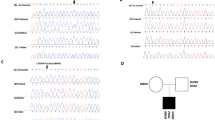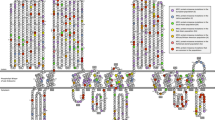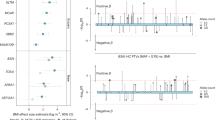Abstract
Background:
A significant proportion of severe familial forms of obesity remain genetically elusive. Taking advantage of our unique cohort of multigenerational obese families, we aimed to assess the contribution of rare mutations in 29 common obesity-associated genes to familial obesity, and to evaluate in these families the putative presence of nine known monogenic forms of obesity.
Methods:
Through next-generation sequencing, we sequenced the coding regions of 34 genes involved in polygenic and/or monogenic forms of obesity in 201 participants (75 normal weight individuals, 54 overweight individuals and 72 individuals with obesity class I, II or III) from 13 French families. In vitro functional analyses were performed to investigate the mutation PCSK1-p.Arg80* which was identified in a family.
Results:
A novel heterozygous nonsense variant in PCSK1 (p.Arg80*), encoding a propeptide truncated to less than two exons (out of 14), was found to co-segregate with obesity in a three-generation family. We demonstrated that this mutation inhibits PCSK1 enzyme activity and that this inhibition most likely does not involve a strong physical interaction. Furthermore, both mutations PCSK1-p.Asn180Ser and POMC-p.Phe144Leu, which had previously been reported to be associated with severe obesity, were also identified in this study, but did not co-segregate with obesity. Finally, we did not identify any rare mutations co-segregating with obesity in common obesity susceptibility genes, except for CADM2 and QPCTL, where we found two novel variants (p.Arg81His and p.Leu98Pro, respectively) in three obese individuals.
Conclusions:
We showed for the first time that a nonsense mutation in PCSK1 was likely to cause dominantly inherited human obesity, due to the inhibiting properties of the propeptide fragment encoded by the null allele. Furthermore, the present family sequencing design challenged the contribution of previously reported mutations to monogenic or at least severe obesity.
This is a preview of subscription content, access via your institution
Access options
Subscribe to this journal
Receive 12 print issues and online access
$259.00 per year
only $21.58 per issue
Buy this article
- Purchase on Springer Link
- Instant access to full article PDF
Prices may be subject to local taxes which are calculated during checkout


Similar content being viewed by others
References
El-Sayed Moustafa JS, Froguel P From obesity genetics to the future of personalized obesity therapy. Nat Rev Endocrinol 2013; 9: 402–413.
Ramachandrappa S, Farooqi IS Genetic approaches to understanding human obesity. J Clin Investig 2011; 121: 2080–2086.
Berndt SI, Gustafsson S, Mägi R, Ganna A, Wheeler E, Feitosa MF et al. Genome-wide meta-analysis identifies 11 new loci for anthropometric traits and provides insights into genetic architecture. Nat Genet 2013; 45: 501–512.
Bonnefond A, Clément N, Fawcett K, Yengo L, Vaillant E, Guillaume J-L et al. Rare MTNR1B variants impairing melatonin receptor 1B function contribute to type 2 diabetes. Nat Genet 2012; 44: 297–301.
Helgason H, Sulem P, Duvvari MR, Luo H, Thorleifsson G, Stefansson H et al. A rare nonsynonymous sequence variant in C3 is associated with high risk of age-related macular degeneration. Nat Genet 2013; 45: 1371–1374.
Seddon JM, Yu Y, Miller EC, Reynolds R, Tan PL, Gowrisankar S et al. Rare variants in CFI, C3 and C9 are associated with high risk of advanced age-related macular degeneration. Nat Genet 2013; 45: 1366–1370.
Zhan X, Larson DE, Wang C, Koboldt DC, Sergeev YV, Fulton RS et al. Identification of a rare coding variant in complement 3 associated with age-related macular degeneration. Nat Genet 2013; 45: 1375–1379.
Gray J, Yeo GSH, Cox JJ, Morton J, Adlam A-LR, Keogh JM et al. Hyperphagia, severe obesity, impaired cognitive function, and hyperactivity associated with functional loss of one copy of the brain-derived neurotrophic factor (BDNF) gene. Diabetes 2006; 55: 3366–3371.
Han JC, Liu Q-R, Jones M, Levinn RL, Menzie CM, Jefferson-George KS et al. Brain-derived neurotrophic factor and obesity in the WAGR syndrome. N Engl J Med 2008; 359: 918–927.
Montague CT, Farooqi IS, Whitehead JP, Soos MA, Rau H, Wareham NJ et al. Congenital leptin deficiency is associated with severe early-onset obesity in humans. Nature 1997; 387: 903–908.
Strobel A, Issad T, Camoin L, Ozata M, Strosberg AD A leptin missense mutation associated with hypogonadism and morbid obesity. Nat Genet 1998; 18: 213–215.
Clément K, Vaisse C, Lahlou N, Cabrol S, Pelloux V, Cassuto D et al. A mutation in the human leptin receptor gene causes obesity and pituitary dysfunction. Nature 1998; 392: 398–401.
Farooqi IS, Yeo GS, Keogh JM, Aminian S, Jebb SA, Butler G et al. Dominant and recessive inheritance of morbid obesity associated with melanocortin 4 receptor deficiency. J Clin Investig 2000; 106: 271–279.
Vaisse C, Clement K, Durand E, Hercberg S, Guy-Grand B, Froguel P Melanocortin-4 receptor mutations are a frequent and heterogeneous cause of morbid obesity. J Clin Investig 2000; 106: 253–262.
Vaisse C, Clement K, Guy-Grand B, Froguel P A frameshift mutation in human MC4R is associated with a dominant form of obesity. Nat Genet 1998; 20: 113–114.
Yeo GSH, Connie Hung C-C, Rochford J, Keogh J, Gray J, Sivaramakrishnan S et al. A de novo mutation affecting human TrkB associated with severe obesity and developmental delay. Nat Neurosci 2004; 7: 1187–1189.
Jackson RS, Creemers JW, Ohagi S, Raffin-Sanson ML, Sanders L, Montague CT et al. Obesity and impaired prohormone processing associated with mutations in the human prohormone convertase 1 gene. Nat Genet 1997; 16: 303–306.
Krude H, Biebermann H, Luck W, Horn R, Brabant G, Grüters A . Severe early-onset obesity, adrenal insufficiency and red hair pigmentation caused by POMC mutations in humans. Nat Genet 1998; 19: 155–157.
Doche ME, Bochukova EG, Su H-W, Pearce LR, Keogh JM, Henning E et al. Human SH2B1 mutations are associated with maladaptive behaviors and obesity. J Clin Investig 2012; 122: 4732–4736.
Bonnefond A, Raimondo A, Stutzmann F, Ghoussaini M, Ramachandrappa S, Bersten DC et al. Loss-of-function mutations in SIM1 contribute to obesity and Prader-Willi-like features. J Clin Investig 2013; 123: 3037–3041.
Ramachandrappa S, Raimondo A, Cali AMG, Keogh JM, Henning E, Saeed S et al. Rare variants in single-minded 1 (SIM1) are associated with severe obesity. J Clin Investig 2013; 123: 3042–3050.
Benzinou M, Creemers JWM, Choquet H, Lobbens S, Dina C, Durand E et al. Common nonsynonymous variants in PCSK1 confer risk of obesity. Nat Genet 2008; 40: 943–945.
Creemers JWM, Choquet H, Stijnen P, Vatin V, Pigeyre M, Beckers S et al. Heterozygous mutations causing partial prohormone convertase 1 deficiency contribute to human obesity. Diabetes 2012; 61: 383–390.
Stutzmann F, Tan K, Vatin V, Dina C, Jouret B, Tichet J et al. Prevalence of melanocortin-4 receptor deficiency in Europeans and their age-dependent penetrance in multigenerational pedigrees. Diabetes 2008; 57: 2511–2518.
Liu X, Jian X, Boerwinkle E dbNSFP: a lightweight database of human nonsynonymous SNPs and their functional predictions. Hum Mutat 2011; 32: 894–899.
Adzhubei IA, Schmidt S, Peshkin L, Ramensky VE, Gerasimova A, Bork P et al. A method and server for predicting damaging missense mutations. Nat Meth 2010; 7: 248–249.
Ng PC, Henikoff S SIFT: predicting amino acid changes that affect protein function. Nucleic Acids Res 2003; 31: 3812–3814.
Schwarz JM, Rödelsperger C, Schuelke M, Seelow D MutationTaster evaluates disease-causing potential of sequence alterations. Nat Meth 2010; 7: 575–576.
Chun S, Fay JC Identification of deleterious mutations within three human genomes. Genome Res 2009; 19: 1553–1561.
Farooqi IS, Volders K, Stanhope R, Heuschkel R, White A, Lank E et al. Hyperphagia and early-onset obesity due to a novel homozygous missense mutation in prohormone convertase 1/3. J Clin Endocrinol Metab 2007; 92: 3369–3373.
Fugere M, Limperis PC, Beaulieu-Audy V, Gagnon F, Lavigne P, Klarskov K et al. Inhibitory potency and specificity of subtilase-like pro-protein convertase (SPC) prodomains. J Biol Chem 2002; 277: 7648–7656.
Dubern B, Lubrano-Berthelier C, Mencarelli M, Ersoy B, Frelut M-L, Bouglé D et al. Mutational analysis of the pro-opiomelanocortin gene in French obese children led to the identification of a novel deleterious heterozygous mutation located in the alpha-melanocyte stimulating hormone domain. Pediatr Res 2008; 63: 211–216.
Hinney A, Becker I, Heibült O, Nottebom K, Schmidt A, Ziegler A et al. Systematic mutation screening of the pro-opiomelanocortin gene: identification of several genetic variants including three different insertions, one nonsense and two missense point mutations in probands of different weight extremes. J Clin Endocrinol Metab 1998; 83: 3737–3741.
Stutzmann F, Vatin V, Cauchi S, Morandi A, Jouret B, Landt O et al. Non-synonymous polymorphisms in melanocortin-4 receptor protect against obesity: the two facets of a Janus obesity gene. Hum Mol Genet 2007; 16: 1837–1844.
Seidah NG The proprotein convertases, 20 years later. Meth Mol Biol 2011; 768: 23–57.
Strawbridge RJ, Dupuis J, Prokopenko I, Barker A, Ahlqvist E, Rybin D et al. Genome-wide association identifies nine common variants associated with fasting proinsulin levels and provides new insights into the pathophysiology of type 2 diabetes. Diabetes 2011; 60: 2624–2634.
Frank GR, Fox J, Candela N, Jovanovic Z, Bochukova E, Levine J et al. Severe obesity and diabetes insipidus in a patient with PCSK1 deficiency. Mol Genet Metab 2013; 110: 191–194.
Jackson RS, Creemers JWM, Farooqi IS, Raffin-Sanson M-L, Varro A, Dockray GJ et al. Small-intestinal dysfunction accompanies the complex endocrinopathy of human proprotein convertase 1 deficiency. J Clin Investig 2003; 112: 1550–1560.
Martín MG, Lindberg I, Solorzano-Vargas RS, Wang J, Avitzur Y, Bandsma R et al. Congenital proprotein convertase 1/3 deficiency causes malabsorptive diarrhea and other endocrinopathies in a pediatric cohort. Gastroenterology 2013; 145: 138–148.
Goodman LJ, Gorman CM Autoproteolytic activation of the mouse prohormone convertase mPC1. Biochem Biophys Res Commun 1994; 201: 795–804.
Rabah N, Gauthier D, Wilkes BC, Gauthier DJ, Lazure C Single amino acid substitution in the PC1/3 propeptide can induce significant modifications of its inhibitory profile toward its cognate enzyme. J Biol Chem 2006; 281: 7556–7567.
Basak A, Koch P, Dupelle M, Fricker LD, Devi LA, Chretien M et al. Inhibitory specificity and potency of proSAAS-derived peptides toward proprotein convertase 1. J Biol Chem 2001; 276: 32720–32728.
Basak A, Lazure C Synthetic peptides derived from the prosegments of proprotein convertase 1/3 and furin are potent inhibitors of both enzymes. Biochem J 2003; 373: 231–239.
He W, Li X, Xu S, Ai J, Gong Y, Gregg JL et al. Aberrant methylation and loss of CADM2 tumor suppressor expression is associated with human renal cell carcinoma tumor progression. Biochem Biophys Res Commun 2013; 435: 526–532.
Kehlen A, Haegele M, Menge K, Gans K, Immel U-D, Hoang-Vu C et al. Role of glutaminyl cyclases in thyroid carcinomas. Endocr Relat Cancer 2013; 20: 79–90.
Park WD, O'Brien JF, Lundquist PA, Kraft DL, Vockley CW, Karnes PS et al. Identification of 58 novel mutations in Niemann-Pick disease type C: correlation with biochemical phenotype and importance of PTC1-like domains in NPC1. Hum Mutat 2003; 22: 313–325.
Acknowledgements
We are sincerely indebted to all participants in the genetic study. We thank Marianne Deweirder and Frédéric Allegaert for their technical assistance and their management of DNA samples. We are grateful to Philippe Gallina for his invaluable help for the recruitment of families. This study was supported by: the Genoscope, the EU-founded EurOCHIP FP7 consortium, ‘Centre National de la Recherche Scientifique’ (CNRS), ‘FWO-Vlaanderen’ and ‘IWT’.
Author information
Authors and Affiliations
Corresponding author
Ethics declarations
Competing interests
The authors declare no conflict of interest.
Additional information
Supplementary Information accompanies this paper on International Journal of Obesity website
Supplementary information
Rights and permissions
About this article
Cite this article
Philippe, J., Stijnen, P., Meyre, D. et al. A nonsense loss-of-function mutation in PCSK1 contributes to dominantly inherited human obesity. Int J Obes 39, 295–302 (2015). https://doi.org/10.1038/ijo.2014.96
Received:
Revised:
Accepted:
Published:
Issue Date:
DOI: https://doi.org/10.1038/ijo.2014.96
This article is cited by
-
Loss of thyroid gland circadian PER2 rhythmicity in aged mice and its potential association with thyroid cancer development
Cell Death & Disease (2022)
-
Prohormone convertase 1/3 deficiency causes obesity due to impaired proinsulin processing
Nature Communications (2022)
-
A novel mutation in the mouse Pcsk1 gene showing obesity and diabetes
Mammalian Genome (2020)
-
Genetic Obesity and Bariatric Surgery Outcome in 1014 Patients with Morbid Obesity
Obesity Surgery (2020)
-
Les obésités monogéniques chez l’enfant
Obésité (2017)



